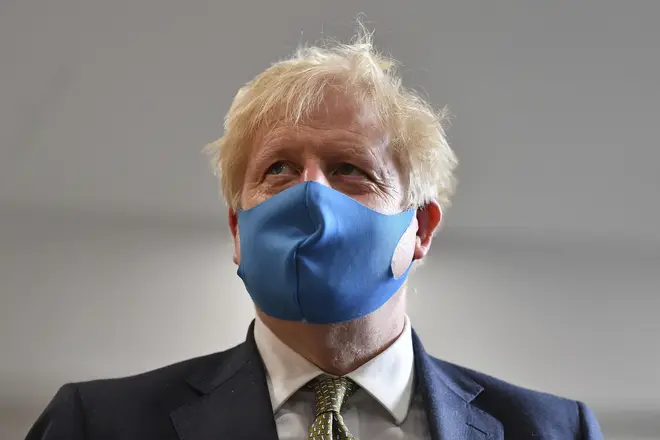
Nick Abbot 10pm - 1am
13 July 2020, 13:25

How to make your own face mask
Many questions are being raised around face masks amid the Covid-19 crisis - will the UK Government advice on masks change? And are face masks effective?
With the coronavirus pandemic a part of everyday life and the UK on lockdown, many people are asking if restrictions measures could be eased if everyone wore face masks in public.
Advice from health organisations across the world is mixed and some countries have insisted people wear masks while out in public.
In England, Scotland and Northern Ireland, face coverings are mandatory when using public transport and Wales will introduce the rule from July 27.
Face coverings are also mandatory in Scottish shops, although that is not the case in England, Prime Minister Boris Johnson has indicated the advice could change in the next few days.
The Government's top advisers have met several times to discuss using masks.
One top doctor has said it would make sense to advise the public to wear coverings on a voluntary basis and expects the Government to alter its guidance.
The chairman of the Royal College of General Practitioners Professor Martin Marshall said: "If [people] are coughing and spluttering then it makes complete sense to wear masks in order to protect other people."
He said: "I think the guidance that we're expecting to hear is that the wearing of face masks is a voluntary activity not mandated and it certainly makes a lot of sense to focus limited resources that we have at the moment on those who have the greatest need and that's the health professionals."
Read more: Boris Johnson says face masks have 'great deal of value' in confined spaces like shops
However, Boris Johnson has urged the public to wear face coverings in shops, and said an announcement on whether their use will be compulsory in England will be made in the coming days.
The Prime Minister said that ministers are considering what "tools of enforcement" could be employed as he described the evidence to support their use to slow the spread of coronavirus as "growing".
Downing Street said on Monday that a formal review was underway after the Government faced calls for clarity on the subject.
But Labour called on the Government to address the "confusion" around the use of non-surgical masks "without delay".

NHS bosses have urged the Government to make sure that there are enough masks for medical staff before making any compulsory orders for the public.
Chris Hopson, chief executive of NHS Providers, which represents hospitals and NHS trusts in England, asked ministers to "fully assess" the potential impact on healthcare supplies.
In a statement on Monday, he said: "Fluid repellent masks for health and care staff are key to safety and to avoid the spread of coronavirus.
"Securing the supply of masks, when there is huge global demand, is crucial. This must be a key consideration for Government.
"There needs to be clear evidence that wearing masks, along with other measures, will deliver significant enough benefits to take us out of lockdown to potentially jeopardise NHS mask supply."
Listen & subscribe: Global Player | Apple Podcasts | Google Podcasts | Spotify
The Government has said it "can't promise" everybody will be given a mask for free if the public are forced to wear them.
Matt Hancock was asked the question by former Labour minister Hilary Benn in the House of Commons, and replied: "I can't promise that we will give everybody free masks, I mean that would be an extraordinary undertaking, and we do have to make sure that we have supplies available especially for health and social care staff, where the scientific advice throughout has been that the wearing of masks is necessary in those circumstances and we've got to make sure the provision is there for them."
According to European scientists, there is no evidence that non-medical standard face masks or other covers offer protection to wearers.
The European Centre for Disease Prevention and Control says that a non-medical mask has a filter efficiency of between two and 38%.
The World Health Organisation (WHO) says masks are useful in some settings, including when worn by those who are ill, but says “the wide use of masks by healthy people in the community setting is not supported by current evidence”.It says medical-grade face masks should be reserved for health care workers, a position currently adopted in the UK.

Should we all wear face masks in public?
Masks can be made from cloth materials found at home, or items that can be wrapped around the face such as a scarf, see our video at the top of the page for a short instruction on how to make your own mask.
Trish Greenhalgh, professor of primary healthcare at the University of Oxford, told a Royal Society of Medicine web briefing: "How do you make your own mask? You take two pieces of cotton, or a piece of cotton folded over, and you take a pantyliner or something like that [with] waterproof backing, you stick it between those.
"And then you hook it around the back of your ears."

Who should be wearing facemasks? WHO Special Envoy gives his advice
European researchers have suggested cloth masks may not be effective for healthcare settings.
The European Centre for Disease Prevention and Control said rates of illness were much higher among healthcare staff using masks made out of cloth instead of surgical masks.
It said: "Altogether, common fabric cloth masks are not considered protective against respiratory viruses and their use should not be encouraged.
"In the context of severe personal protective equipment (PPE) shortages, and only if surgical masks or respirators are not available, homemade cloth masks (eg scarves) are proposed as a last-resort interim solution by the US CDC until availability of standard PPE is restored."